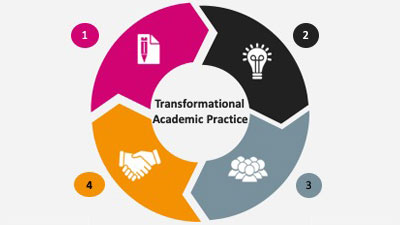The OCAED vision is to inspire transformational academic practice, with a mission is to offer inclusive, collaborative and compassionate academic enhancement and development.
OCAED’s support, activities and resources are available to anyone teaching and supporting learning for, or on, a Brookes’ programme of study on campus or at an Associate College Partner institution. Our offer is relevant to our entire Education portfolio, including (but not limited to) undergraduate and postgraduate study, short courses and degree apprenticeships. We also offer a flourishing consultancy service to the wider sector.
Our holistic academic development framework enables transformational academic practice and supports the Oxford Brookes Strategy 2035.
Transformational academic practice is an inclusive, accessible and collaborative approach to teaching, research and innovation. Inherently progressive, transformational academic practice aims to enable the next generation of graduate citizens to meet the social, economic and ecological challenges facing our immediate and global communities.
We exemplify best inclusive practice in all we do and are working to ensure our offer is relevant to our diverse learning community, for example we consult the OCAED Stakeholder Forum. The forum is a collection of colleagues from across the institution working in a variety of disciplines, professional services and with different backgrounds and characteristics who help shape our offer.
We collaborate with staff, students, and stakeholders to understand and respond to their specific academic development needs. For example, OCAED Faculty Partners work closely with Deans of Education and practising HE teachers. We also consulted the PVC Research & Innovation, Education’s (Unit of Assessment 23) REF Lead, Principal Lecturers and Professors of Education and Student Experience and Professors in co-authoring our HE & Lifelong Learning Strategy.
We care about our learning community, recognise the challenges we face, and question the status quo to act with the community to make positive change. To care, to question, to act to make positive change is the definition of compassion and can be written into academic development (Lawrence and Herrick, 2020) teaching practice (Gilbert, 2019) and organisational structures (Buitendijk, 2019).

